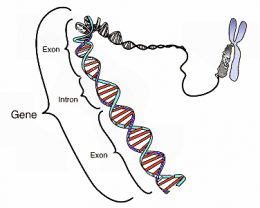April 29, 2010 report
Grandparents favor genetically close grandchildren

(PhysOrg.com) -- New research suggests that grandparents naturally and subconsciously favor the grandchildren who are most closely related to them genetically. The phenomenon is called "sexually antagonistic grandparental care," and it has been known for some time that a grandmother will naturally prefer her son's daughters (with whom she shares 31 percent of her genes) to her son's sons (with whom she shares only 23 percent, suggesting she will most nurture the grandchild who inherits more of her genes.
Dr Urban Friberg of the University of California, Santa Barbara and colleagues used mathematical methods to test the supposition that grandparents “differentially” care for grandchildren according to their lineage and gender.
A father has an XY chromosome pair, with the X derived from his mother and the Y derived from his father. He passes copies of the X to his daughters and Y to his sons. This has evolutionary consequences, according to Friberg’s team, because of the innate drive to ensure the survival of our genes in future generations. The team developed a new paradigm they called the “no-cost-to-self nepotism” rule to generate predictions about the behaviors of grandparents.
The major prediction the group found was that grandmothers (and to a lesser degree, grandfathers) will evolve grandson-harming phenotypes that effectively reduce the competition between siblings, and favor their more closely related granddaughters, especially daughters of their sons (who have definitely inherited the grandmother’s X chromosome).
Women always know their children are their own, while fathers always have some uncertainty because of the possibility they were cuckolded. This means maternal grandmothers know for certain their grandchildren are recipients of copies of their genes, while paternal grandfathers are doubly uncertain about the genetic inheritance of their grandchildren. The results of the current research supports the findings of previous studies that showed a baby girl’s chances of survival are increased if a paternal grandmother cares for her, while a boy’s chances are diminished. If a maternal grandmother is involved, the boys have improved chances of survival.
The results of the study are published in the Proceedings of the Royal Society B.
More information: William R. Rice et al., The evolution of sex-specific grandparental harm, Proceedings of the Royal Society B, Published online before print April 28, 2010, doi:10.1098/rspb.2010.0409
© 2010 PhysOrg.com

















